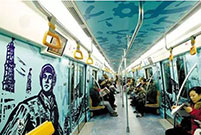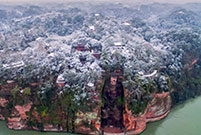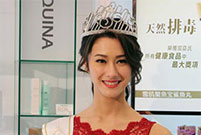


A woman takes a selfie with lion costume in Manhattan's Chinatown in New York, the United States on Feb. 8, 2016. People set off firecrackers and watched lion dance in Manhattan's Chinatown to celebrate Chinese Lunar New Year on Monday. (Xinhua/Li Muzi)
BEIJING, Feb. 11-- As Chinese at home and abroad are celebrating the Spring Festival, or the Lunar New Year, people around the globe also take it as an opportunity to learn more about the Chinese culture and tradition.
The Spring Festival this year, which fell on Feb. 8, marks the beginning of the Year of the Monkey, according to the Chinese zodiac that assigns one of 12 animals, either real or mythological, to each year.
In other countries, the most festive season in China has also become a bridge for cultural exchange with the Asian giant.
On Tuesday, the Chinese Lunar New Year festivity filled the air at the Lincoln Center when the New York Philharmonic, which started the tradition to host an annual Lunar New Year concert in 2012 to celebrate the cultural heritage of China and honor the Chinese-American community, was playing classical pieces by Chinese composers.
What stunned the audience most was the final piece, also the New York premier of Chinese composer Tan Dun's symphony "Nu Shu: The Secret Songs of Women". It was not just a multi-layered symphony with sheer sonic grandeur and a triumphant finale, but an audiovisual masterpiece aimed at preserving a disappearing ancient language used exclusively by some women in south central China's Hunan Province.
"This (Nu Shu) is a tour de force, a work of art," Barbara Tober told Xinhua. "It is very unusual and beautiful to watch, especially as it built up to the end where the women were working together. It was glorious."
In San Jose, the house of Raymond Tang and his wife Isabel Yung, a typical family of Chinese diaspora in the Central American country of Costa Rica, was adorned with red colors and had its door covered in Chinese characters and panels.
In addition, the Tang family was actively involved in preparation work for cultural activities planned by the Chinese community in Costa Rica on the occasion to offer locals a glimpse of China and bring the two cultures closer.
"I think people in Costa Rica know what the Chinese New Year is. People called me and wished me a happy Year of the Monkey and all the best in the year to come," said Yung.
Francesca Romana Di Biagio, an Italian journalist at Il Giornale newspaper in Milan, said more and more Italians, including many who have no links with China, like to celebrate the Spring Festival.
"This festival has become increasingly popular in Milan. Many people have the habit of celebrating it in Chinese restaurants, which is also a sign of a growing integration of the Chinese community in Italy," she explained.
In fact, in the early 1990s Milan used to celebrate the Spring Festival with "extraordinary dragons and lanterns full of colors and joy," noted Davide Rossi, a historian and director of the Locarno-based ISPEC Institute of History and Philosophy of Contemporary Thought.
"This means that the Chinese community in Milan since a long time ago has been a very influential presence able to transfer the value and beauty of Chinese traditions," he said.
Rossi said he has never celebrated the Spring Festival in China, yet every year he feels increasingly close to the Chinese people in enjoying the festive atmosphere, no matter in which part of the world.
According to official statistics, China's Ministry of Culture has organized more than 800 events to celebrate last year's Spring Festival in over 320 cities in 118 countries and regions.
China has so far established 25 cultural centers abroad, in a bid to promote the Chinese culture and strengthen cultural exchange and cooperation with other countries.
In November 2015, Chinese President Xi Jinping and Singaporean Emeritus Senior Minister Goh Chok Tong unveiled the China Cultural Center during a visit to the city state, which shares cultural roots and maintains close relations with China as a predominantly ethnic Chinese society.
Phua Kok Khoo, president of Singapore's China Friendship Association, spoke highly of China's efforts in promoting its culture and tradition.
From China's traditional thoughts of "peaceful coexistence" and "seeking harmony in diversity", Xi has proposed such ideas as peaceful development and win-win cooperation to handle international issues, said Phua, who was invited to a welcoming dinner for the Chinese president.
With the promotion of the Chinese tradition and culture, China has clearly shown the whole world its future direction of development, he said.
 Have you ever taken these beautiful subways in China?
Have you ever taken these beautiful subways in China? Chinese beauties, foreign models meet in Chengdu
Chinese beauties, foreign models meet in Chengdu Awesome! Aerial pictures taken on J-11 fighter
Awesome! Aerial pictures taken on J-11 fighter A foreign girl explains what China should be proud of
A foreign girl explains what China should be proud of Chinese navy's air-cushioned landing craft in pictures
Chinese navy's air-cushioned landing craft in pictures Chinese pole dancing master opens class in Tianjin
Chinese pole dancing master opens class in Tianjin Splendid Sichuan after snow
Splendid Sichuan after snow College girl of Vancouver crowned Miss Chinese Int'l 2016
College girl of Vancouver crowned Miss Chinese Int'l 2016 Pentagonal Mart becomes the largest vacant building in Shanghai
Pentagonal Mart becomes the largest vacant building in Shanghai Top 20 hottest women in the world in 2014
Top 20 hottest women in the world in 2014 Top 10 hardest languages to learn
Top 10 hardest languages to learn 10 Chinese female stars with most beautiful faces
10 Chinese female stars with most beautiful faces China’s Top 10 Unique Bridges, Highways and Roads
China’s Top 10 Unique Bridges, Highways and Roads After spate of espionage allegations, US law firm opens first China office
After spate of espionage allegations, US law firm opens first China office Author Feng Tang attacks decision to pull book from shelves
Author Feng Tang attacks decision to pull book from shelves Going ape for New Year
Going ape for New Year Black lungs
Black lungsDay|Week